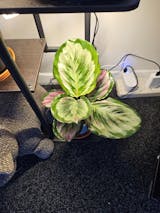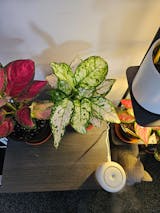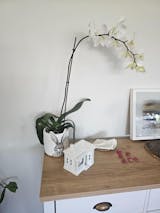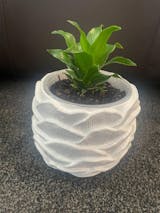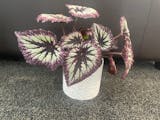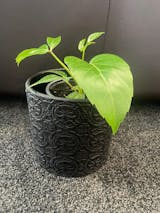
Fittonia Care
Fittonia's are beautiful tropical plants that can be easy to care for, once you know how.
This guide provides you with all you need to know to have a happy Fittonia that thrives.
All you need to know to keep your Fittonia happy
Fittonia, also known as the nerve plant, is a beautiful and unique addition to any indoor garden. These tropical plants are known for their striking leaves that are adorned with vibrant pink, white, or red veins. However, keeping a Fittonia happy can be a bit tricky. In this blog post, we'll go over everything you need to know to keep your Fittonia healthy and thriving.
Fittonias prefer warm temperatures and high humidity. This is not something that we usually have in abundance in our homes, but a few tweaks and you can replicate their natural habitat and keep them happy. Let's take a closer look at the key areas to consider.
What lighting do Fittonias like?
Fittonias prefer bright, indirect light and can tolerate low light levels. However, direct sunlight can scorch their leaves, so be sure to place your Fittonia in a spot where it will receive bright light but not direct sunlight.
How often should I water my Fittonia?
This really depends on a number of factors. You can read more about those in this blog. I always recommend checking the soil to determine the frequency to water. If you’ve owned a Fittonia, you have likely witnessed their spectacular tantrums, where they can go from looking lush, to looking dead at the blink of an eye. This is usually a sign that they’re thirsty. Hey, at least they tell you! Fittonias like to be kept consistently moist, but not waterlogged. It's best to water your Fittonia when the top inch of soil is dry to the touch, but if you happen to leave it too long, they’ll certainly let you know and should perk up just as fast. Be sure to use a well-draining soil mix (I use a mix of potting mix with perlite mixed through) and consider using a pot with drainage holes to help prevent waterlogging.
Given Fittonia prefer higher humidity, you can achieve this by grouping plants together, or using a humidifier or placing a tray of water near the plant to increase the humidity. You can also spray mist them with some water, especially during the warmer months.
Common Fittonia problems you can overcome:
-
Brown crispy leaves -
This can be caused by dry air, too much direct sunlight, or over-watering. To fix this issue, make sure your Fittonia is getting the right amount of indirect sunlight, increase humidity, and adjust your watering schedule as needed.
-
Yellow leaves -
This can be caused by too much direct sunlight, over-watering, or a lack of nutrients. To fix this issue, move your Fittonia to a spot with less direct sunlight, adjust your watering schedule, and consider fertilizing your plant with a balanced fertilizer.
-
Pests -
Fittonias can also be prone to pests such as spider mites and mealybugs. To prevent these pests, make sure to keep your Fittonia clean by wiping the leaves with a damp cloth, and consider using a natural pesticide such as neem oil if pests do become a problem.
Are Fittonias safe for my pets?
They most certainly are! This is one plant that you can have in your home that is non-toxic for your fur babies. Even more reason to add them to your wish list!
In my opinion, Fittonia's, whilst a little temperamental, are totally worth the effort and when you work out their happy space, they will bring a touch of tropical beauty to your home. Make sure to provide your Fittonia with bright, indirect light, keep the soil consistently moist, and maintain warm temperatures and high humidity. And, if you encounter any common problems such as brown or yellow leaves or pests, make the necessary adjustments to fix the issue. With the right care, your Fittonia will thrive, and you will feel proud of your efforts and enjoy watching such a gorgeous plant, grow in your home.
I truly hope this has helped you feel confident when it comes to Fittonia care. If you still have unanswered questions, please don’t feel that you have to work them out yourself. Just email me (chontelle@thelilypot.co.nz) and let’s chat, I’d so love to help you!
Chontelle
Fittonia
Feeling a little more confident with Fittonia care? Find your perfect match here.
Complimentary Plant Care
We only stock what we have tried and tested and personally love




















